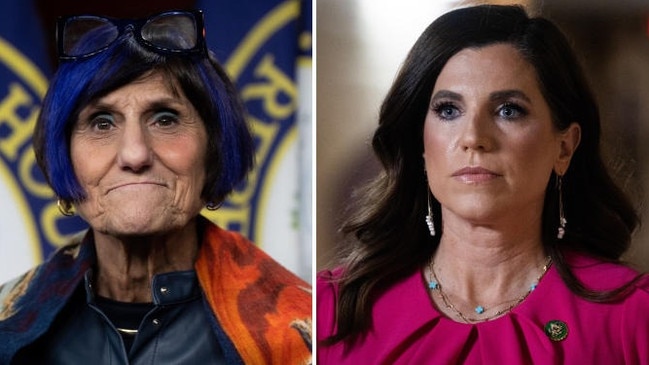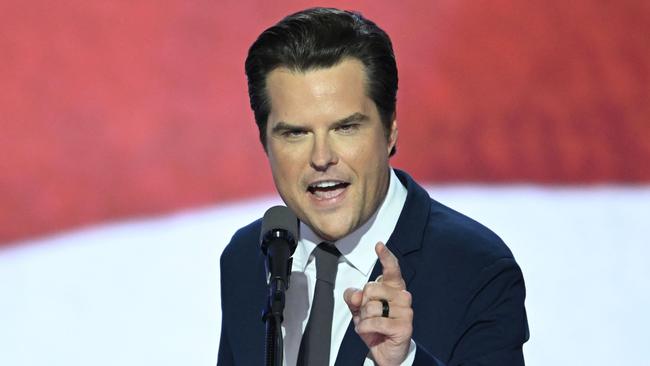How foundation and eyeliner became a political battleground
Appearance-based insults are becoming more common, all the way up to the Capitol Building.

Is makeup political? A debate is playing out on social media over beauty and what it might say about someone’s personal values. On one side, people are taking aim at so-called “Republican makeup,” lampooning heavy foundation and overfilled eyebrows as an expression of conservative values. In response, conservatives are accusing liberals of clumsily applied, clownish makeup that doesn’t align with traditional gender norms, mocking bright hair dye, piercings and neon lipstick.
It’s the latest evolution of online discourse in a highly fractured political environment, where appearance-based insults are becoming more common all the way up to the Capitol Building.
“This sort of attack can be appealing to a type of online person who is not otherwise paying attention to politics,” said Maggie Macdonald, assistant professor of political science at the University of Kentucky.
For the past few months, “Republican makeup” has trended on social media. Hundreds of videos from women, most of them left-leaning, critique and parody the getting-ready routines of prominent Republicans. Some videos weave in tongue-in-cheek political commentary, but for the most part, the implication is simple: being conservative, these users are saying, doesn’t just mean you support certain policies; it means you actually have bad taste.
Meanwhile, some TikTok users are posting videos with filters that draw messy red lips, blue eye shadow, clumsy mascara and mustache hair, dubbing it “liberal makeup.” On and offline, “blue-haired liberals” is a common jab used against the left. Rep. Rosa DeLauro came under fire on social media last week for her appearance during President Trump’s speech to a joint session of Congress. The Connecticut Democrat is known for having brightly dyed hair.
“You’re just conforming to a new set of beauty expectations,” Misha Petrov, a conservative cultural commentator, said of liberal makeup in a February YouTube video, “one that, in my opinion, makes you look like a poisonous frog.” In a statement, Petrov said her take was meant to be a humorous one.
In posts on X and Facebook, DeLauro wrote that she had been criticized for her appearance her whole life.
“But I love my self-expression and no troll is changing that,” she wrote. “It makes me effective for the people.” Jessica Poling, a sociology professor at Sarah Lawrence College, said makeup was one of the tools people used to communicate messages to others about their gender, consciously or unconsciously. How you do your makeup can send the same subliminal messages about race, social class or sexuality, creating a sense of identity and community.
In the political sphere, Poling said, that might mean thinking that if someone does their makeup differently from you, they must think differently from you. So when a person picks on someone’s appearance or their makeup, Poling said, that action creates “in-groups” and “out-groups,” an essential part of building a social hierarchy.
“It often becomes a generalizable, visible identifier of, ‘Are you like me, or are you different in some way?’” Poling said.
Several professional makeup artists said they did not believe that there was a true difference between how right-leaning women and left-leaning women did their makeup.
“What lies beneath the trend of poking fun at this MAGA makeup speaks to the collective anger that many women feel in Trump’s America,” said Lauren McGrath, 33, a makeup artist with Los Angeles-based Salt Spell Beauty. “It’s indicative of a fracturing that’s going on with women.” Comedian Suzanne Lambert, who popularized “Republican makeup” in the fall, said her posts were meant to be cutting and provocative. Accuracy is not necessarily the goal.
“They’ve called us blue-haired liberals for years, right?” said Lambert, a former Republican who has light brown-blonde hair, in an interview. “They’ll make fun of our tattoos and our piercings, and we’ve never really clapped back.” Lambert said she viewed her critiques as less about the person’s actual appearance and more about their skills applying makeup. But if the videos are taken as insults, she said, she has no qualms about that.
“I lose zero sleep at night knowing that I’m hurting the feelings of people who are committing atrocities against my fellow Americans, my friends and my neighbors,” Lambert said.
In one video last fall, Lambert ridiculed the eye shadow and contouring techniques of Rep. Nancy Mace, a South Carolina Republican. Mace’s communications director Gabrielle Lipsky called the videos and posts “manufactured outrage.” “The same people dressing up as woodland creatures and using litter boxes now want to be the experts of beauty?” Lipsky said in a statement. “The same crowd that insists men in full beards and lipstick are the pinnacle of femininity? The left should be worried about a lot more than how normal people outside of their woke-cult apply makeup.”

As long as women on both sides of the aisle have been in politics, their appearances have been scrutinized. Recall Michelle Wolf’s joke at the 2018 White House Correspondents’ Association Dinner aimed at then-White House press secretary Sarah Huckabee Sanders: “She burns facts, and then she uses that ash to create a perfect smoky eye. Like, maybe she’s born with it, maybe it’s lies.” At the time, Wolf’s joke was met with widespread outrage and accusations of sexism. From the other side, for years, detractors of former first lady Michelle Obama have called her “Big Mike,” a nickname used as an insult to falsely suggest she was born male.

Though appearance-based attacks have been made against male public figures -- think former President Barack Obama’s tan suit controversy, or online ridicule after former Florida Rep. Matt Gaetz’s 2024 Republican National Convention appearance -- they haven’t always had the same cultural impact.
As Poling put it, looking rumpled for men is “not seen as a character defect in the way that it is for women.” In a text message, Gaetz, whose bronzer makeup and eyebrows have been subjected to social media critiques since last summer, said that he had learned how to apply makeup from Florida Gov. Ron DeSantis.
“He gave me tips he had learned from his wife, who was a successful TV personality,” Gaetz wrote, referring to Casey DeSantis, a former TV news host. “Clearly, I need a refresher course!” Looks-based spats have spilled onto the House floor. Last May, Rep. Marjorie Taylor Greene, a controversial Republican lawmaker who has spread conspiracy theories, suggested during a House Oversight Committee hearing that Rep. Jasmine Crockett’s “fake eyelashes” were interfering with her reading skills. In response, Crockett, a Texas Democrat, said Greene had a “bleach-blonde, bad built, butch body.”
The Wall Street Journal






To join the conversation, please log in. Don't have an account? Register
Join the conversation, you are commenting as Logout